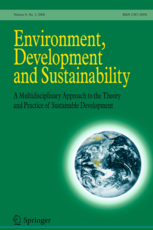Happiness: bringing higher education towards sustainability

 Earlier this year, M.Carolina Escobar-Tello and Tracy Bhamra (both Loughborough Design School) published an article entitled “Happiness as a harmonising path for bringing higher education towards sustainability” in the international and multidisciplinary journal Environment, Development and Sustainability.
Earlier this year, M.Carolina Escobar-Tello and Tracy Bhamra (both Loughborough Design School) published an article entitled “Happiness as a harmonising path for bringing higher education towards sustainability” in the international and multidisciplinary journal Environment, Development and Sustainability.
The abstract reads: “This paper is a reflection of an innovative project that complements existing higher education for sustainable development (HESD) approaches within universities by providing an alternative path to embed sustainable lifestyles within the student population. It presents the SLEUTH project; an initiative born out of the need to reduce energy consumption of students at university but that, due to its systemic design, transforms and goes beyond purely energy reduction and brings Happiness as an approach to build sustainable lifestyles. This is the distinct feature of this initiative, proposing it as adding value to existing HESD approaches. The paper describes and discusses the collaborative building process, implementation and results in detail. The experiences gathered during the project are used and analysed through ‘participant observation’, ‘documents’, ‘questionnaires’ and ‘theme-ing coding’ techniques as a means to understand the richness and diversity of the data resulting from a combination of formal and informal learning settings. Through empirical evidence, this analysis presents ‘real life’ evidence to suggest, firstly the initiative’s design success, its impact on energy consumption and contribution to happiness and sustainable lifestyles. Secondly, a successful example for the contribution to existing HESD frameworks that move away from indoctrination and instead leans towards pro-activeness, self-organisation and voluntary collective action.”
In defining happiness as “a state of deep contentment (serenity and fulfilment) with one’s life, which results from the combination of three variables: feeling in a positive mood (1), life satisfaction (2) and genetics (3)”, this thought-provoking paper challenges assumptions regarding what makes people happy, particularly in terms of consumption, while also advocating that we change our lifestyles into sustainable ones and that we do so as a community. With a particular focus on energy saving, this research utilises the findings from a group of Loughborough students living on campus, encourages them to reflect upon their everyday actions, and highlights the benefits of pro-activeness and social interaction. Ultimately, it is an invitation to shape and deliver more sustainable, happier, university experiences.
This is the third in our series of blog posts regarding publications by Loughborough University staff on pedagogical issues. Further information regarding this particular publication is available online via LUPIN; the full citation follows: M.Carolina Escobar-Tello & Tracy Bhamra (2013), “Happiness as a harmonising path for bringing higher education towards sustainability”, in Environment, Development and Sustainability, Volume 15 Issue 1, pp.177-197. doi: 10.1007/s10668-012-9382-4